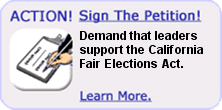
Governor Floats Curbs On Campaigns
SACRAMENTO - Gov. Arnold Schwarzenegger, who made "cleaning up" Sacramento the hallmark of his election bid, will introduce campaign finance legislation this week that would prohibit both lawmakers and the governor from fund raising during state budget deliberations. The legislation would make it a felony to intentionally skirt campaign finance law.
"The governor wants to get tough on anyone who would flout campaign finance law," communications director Rob Stutzman told reporters Tuesday.
Since winning last October's recall election, Schwarzenegger has raised at least $10.5 million through six political committees. Schwarzenegger, a Republican, has outpaced his predecessor, Democratic Gov. Gray Davis, a prodigious fund-raiser who collected roughly $6.3 million for his own campaign committee during his first six months in office.
Schwarzenegger's legislative package would create a blackout period for soliciting contributions, from the time the budget is introduced in January to the time the governor signs the budget into law, roughly six months later. It also would strengthen public disclosure requirements for political donations.
Schwarzenegger's proposal would apply to money raised expressly for a candidate's election. But it would not block fund raising by campaign committees for ballot measures, which in some cases are controlled by politicians, such as Schwarzenegger's California Recovery Team.
Jim Knox, executive director of California Common Cause, called this an "artificial distinction."
"The governor may wish to make it a distinction," he said, "but I doubt that the donors or the public see it as a distinction."
Knox also called the blackout period an "arbitrary time frame" and said he doubted the legislation would address the problem.
The most intense fund-raising period in the capital is typically at the end of the legislative session in July, when lawmakers are frantically considering bills and pushing through pet projects. Common Cause is working with Assemblywoman Loni Hancock, D-Berkeley, to introduce legislation today to enhance public financing of campaigns.
The details of Schwarzenegger's legislation were not available Tuesday, but Stutzman said the governor would consider changing the blackout period.
Under the new legislation, Schwarzenegger could continue raising funds for two March ballot initiatives -- a $15 billion bond and a balanced-budget amendment, Proposition 57 and 58, respectively -- through his California Recovery Team.
And until the law is changed, Stutzman said the governor will continue to fund-raise so as not to put himself at a competitive disadvantage.
When Schwarzenegger travels to New York next week, one of his stops will be a fund-raiser in which participants have been asked to donate at least $50,000 to attend and $500,000 to become co-chairpeople of his political committee.
Davis' unpopularity with voters stemmed, in part, from the perception that he was obsessed with fund raising. Stutzman sought to distinguish Schwarzenegger from his predecessor and called the half-million-dollar fund-raising solicitation unfortunate.
"It unfairly allows a characterization to be made about the governor's fund raising that it's somehow in some way audacious, which it isn't," Stutzman said. "Californians remain confident that this is a governor who cannot be bought, that money does not influence governmental decisions."
See the article on Contra Costa Times website
(In accordance with Title 17 U.S.C. Section 107, this material is distributed without profit to those who have expressed a prior interest in receiving the included information for research and educational purposes.)

